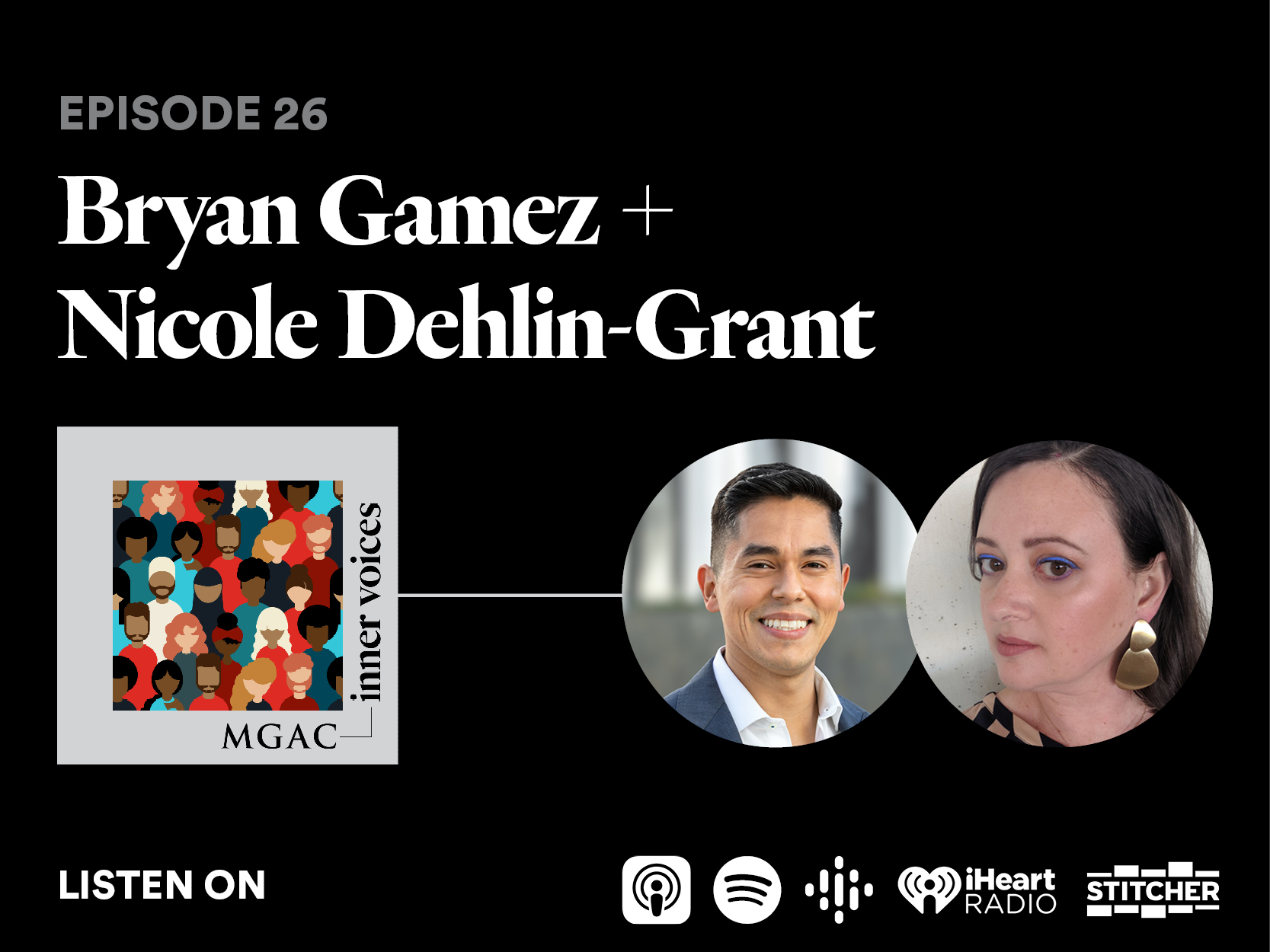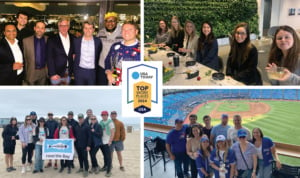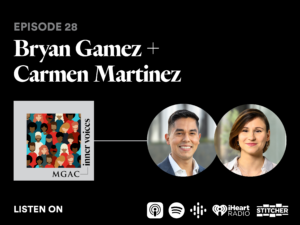MGAC Inner Voices: Episode 26

MGAC Inner Voices is an interview format podcast where a diverse mix of employees are interviewed to share their perspective on challenges they have faced in the A/E/C industry as a result of their identity—including race, ethnicity, religion, age, gender, sexuality, ability, etc. By discussing the experiences of our staff, our hope is that their stories will have newfound and powerful resonance with the audience—both to comfort others in similar situations and to encourage those in positions of power to bring about positive, actionable changes to workplace environments for all A/E/C professionals, regardless of their identity.
Bryan Gamez (MGAC Project Manager, Los Angeles) talks with Nicole Dehlin-Grant IIDA, LEED GA (HLW, Senior Associate, Job Captain, Los Angeles) about her experience handling double standards on-site, leaning on allies in uncomfortable situations, and the necessity of the human touch in an increasingly automated world.
View Transcript
Transcript
Bryan: Hi, everyone, and welcome to "MGAC Inner Voices," a podcast digging into issues of diversity, equity, and inclusion in the architecture, engineering, and construction industry. As always, I gotta preface this podcast by letting everyone know that we're not experts in all things diversity, equity, and inclusion. We're just here to share our stories and discuss how together we're creating better outcomes for all of us in the architecture, engineering, and construction industry and beyond.
So, with that, I'm really happy that you guys are all tuning back in. I'm Bryan, a project manager at MGAC working and living in Los Angeles.
Today, I have a special guest. We have Nicole Dehlin-Grant, an interiors job captain at HLW International in Santa Monica. You know, we've worked on a few different projects together at a previous firm, but I have the utmost respect for this person, and I'm just so happy that she's accepted my invitation to come speak with us today.
Nicole: Of course. Thank you, Bryan.
Bryan: Without further ado, Nicole, do you wanna introduce yourself?
Nicole: Sure. I'm Nicole Dehlin-Grant with HLW in Santa Monica. I've been working in A&D in the LA area since 2002, which puts me into the geriatric millennial category. I've worked as a senior interior designer, an interior designer, graphic designer off and on, librarian early in my career.
Bryan: I did not know that, Nicole.
Nicole: I've worked for furniture dealers. Oh, well. Yeah. You know, everybody has to do their time in the library. That's the interiors industry standard. Go dig in the samples for a while.
Bryan: Exactly.
Nicole: I've worked for furniture companies specifying furniture. I've worked at a historical restoration firm doing really cool old stuff. I've done everything in my career from commercial to hotel to residential to mixed-use, ed, government. You name it, I've done it. Oh, healthcare too. I've done that too. It's all interesting to me.
Bryan: What we're trying to say is if you need a well-rounded interiors architect, you need to hire Nicole Grant from HLW. That's what this is for.
Nicole: It's a really interesting field to work in. It's something I love doing.
Bryan: One thing that struck me about you, Nicole, is you are a fierce woman. I want to have you on this podcast because typically we deal with a lot of men in this industry. Right? And I think that you have this amazing personality and you know exactly what you're doing. And I just wanted to pick your brain on diversity, equity, and inclusion in a field that struggles to really have more representation from women at a higher echelon, right, especially when you're on a job site. So, I wanna start from there. Have you ever been in a situation where there was a conflict and it felt like it was because of your gender that you were being undermined?
Nicole: Yeah. It's kind of tricky working in a profession where on one end, it's very female-led, and then when you get out in the field and you're working with contractors and field supers, and a lot of times, the consultants are all male, there's a dichotomy that you're dealing with on a daily basis. I've had everything happen to me from really supportive men who are like, "Yay, women, let's all go together," to, "Why is there a little girl on the job site? Why isn't she just picking paint? Is she gonna go to West Elm and buy some pillows?" Right? So, it's all over the map. Ironically, it doesn't even matter your age. I'm in the middle of my career, right? So, I'm not a 20-something fresh out of school, but I'll still sometimes have a super contractor look at me and ask me to go fetch them an espresso.
My billable rate is a little bit high for that, just so you know. I'll happily do it, but you're gonna pay me a lot of money to do it. I don't know if you really wanna spend your dollars that way. I think the clearest example of kind of a conflict that I've had recently was a subcontractor who decided that he was correct on a code issue. And unfortunately for him, he's from out of state and isn't as familiar with California building code. You know, with my long-term experience, we're very in the weeds here, and I was very familiar with a particular issue we were having with delayed egress. And delayed egress is not an acceptable system in the state he was from. So, understandably, he didn't know what I was talking about and didn't understand what he needed to do to comply.
And instead of trying to engage on a level where he is asking smart questions and we're figuring out solutions, he instead took the stance that I was being argumentative for the sake of being argumentative. And he hung up on us, which is very juvenile. I happen to be one of those people that's sort of highly technical. I just really don't talk from a place of emotion or feeling. I'm not that kind of person. And I know that, like, without knowing me very well, he wouldn't have been aware of that. But the assumption that women always speak from an emotional place is sort of what I've seen globally from my interaction with men as a whole.
Bryan: Have there ever been any other times when you have felt that you've had this arise? I know that we had talked about potentially a project in Chicago, I believe it was.
Nicole: Yeah. So, a couple of years ago, we had some negative engagement with one of our engineers, and it's someone we work with regularly. So, it was very uncomfortable, but we've been asked by the client to come out on site and review a field condition that was extremely problematic. It was causing a lot of headache. We were looking at project delay, the contractor didn't know what to do, and so it was a big problem. So, we all met on site and I called the consultant that morning and I asked him to be on site, and he was very clearly agitated, told me he had commitments, couldn't come on site. And I told him, I'm like, "Well, the client's requiring us to be on site, so we have to make something work. Either you can come or you can send someone else, but we all have to be there to have a voice."
And by the time we got on site, probably 30 minutes after I spoke to him on the phone, he had clearly wound himself up to a level that was at the breaking point and just started yelling. It's one of the only times in my career where I've actually been, like, cursed at by someone. So, of course, shock and awe is always the immediate reaction. My tendency when I'm faced with an emotional situation like that is to sort of go completely professional face and try to subtract my emotions out of it as much as I can.
Bryan: So difficult to do.
Nicole: Because, of course, you're vulnerable and, you know, we were surrounded by not only the contractor and the subcontractor who were trying to build out this piece of equipment, but the client was on site, the low voltage guys. Like, there were so many people, it was like a group of 20 of us, and he's just standing there screaming at me. And I just told him, I'm like, "Okay, I'm not gonna engage with you at this level. I can tell you're upset, you need to go home, take this home, we will talk later." I've never ordered anyone off site, but that's what I did. I had to order him off site. We went on with our meeting, we finished it, we fixed the issue. That was the problem, thankfully. And, of course, I was letting this sit in the back of my mind for, like, full 30, 40 minutes while we're all meeting on site. I get back to my car, then I have my emotional outburst, and I call my boss and I call my boss's boss, and I tell him what's happened. And I told him, "I'm not gonna work with him anymore. They need to get him away from me." Everyone on my firm was extremely supportive and very unhappy with our consultant.
Immediately reached out, handled the issue, like, to the T. I've actually had something like this happen at another firm, and they were not supportive. So, having my firm really back me up really grounded me and made me feel safe so I could talk about frankly what had actually happened, and then I felt comfortable enough that they had them come back, apologize to me, explain the situation. It turned out, of course, this person was having major emotional issues on the side. He was in the middle of a divorce. Like, everything was a mess.
And it just kind of showed me that if he had engaged with me that morning before we had the meeting about what was going on with him, it would've been a totally different conversation. And he never would've had to ramp up to the level that he got. I hate to see anybody that upset ever, but unfortunately as a woman, I could not have yelled back at him. Where it was sort of pseudo-acceptable for him to have an outburst and, like, throw up his hands and be very dramatic, as a woman, if I did that, I probably would've been fired. So, it's that different wall, right, of how we engage with women who have strong feelings, and how we engage with men that I still struggle with to this day.
Bryan: So, in those events, right, where do you go to, or what do you use as a tool to remain composed? If you're being yelled at, what do you do? How do you rise above that?
Nicole: This is very hard to do in the moment usually when you're taking all this input of someone else's emotions. I try to disconnect myself from what's happening right then and try to remember that it's probably not about me. Which is very difficult, but it serves me better than what I used to do early in my career, which is I would take all the negative input as something directly related to what I was doing and that, like, I was a flawed human being. I think as a woman in general, we tend to absorb other people's reflections of ourselves, right? So...
Bryan: That's a tough one, Nicole.
Nicole: ...we see ourselves the way they do. Right? So, am I pretty today? Am I wearing the right suit? Am I wearing the right shirt? Am I drawing this design drawing correctly? We tend to absorb whatever the commentary around us is. You know, this is something that everybody struggles with. I think feeling other people's feelings and hearing other people's commentary on who you are and what you are as a person is very hard.
Bryan: There's this saying that I recently learned. I think it's, like, an Oprah-ism, but, you know, don't let things pass through you, let them pass over you.
Nicole: Oh, I love that.
Bryan: It's really been so helpful for me.
Nicole: Yeah. Because half the time, it's not actually about you. You're just absorbing their thing that happened with their mom this morning or...and you never really know, especially, like, post-COVID and you don't know what's going on in people's personal lives. And you have to kind of meet people where they are and do your best. That's all you really can do.
Bryan: Speaking of COVID, Nicole, you had an interesting experience with subcontractors, so I'm wondering, are you able to talk a little bit about that?
Nicole: I was lucky to have several projects keep going, some of them quite successfully, which is great. One project I was working on, we had a subcontractor who had very decided opinions on how things were going politically. And this was really early in the pandemic, so there were no N95 masks to be had. My office was great. They supplied a whole bunch of surgical masks, so we were required to wear them on site. So, I'm wearing my hard hat and my mask and I'm wearing my safety vest and my safety goggles, and my goggles are steaming up because of the mask. It was super fun. We all really enjoyed that time, I can tell you. And I'm meeting with the super and the subcontractor for this project. And the subcontractor clearly was uncomfortable with the fact that I was wearing a mask.
He was not wearing one. And this was, like, April of 2020. So, everyone was wearing masks right now, and this guy clearly had made a choice. No one knew what was happening. So, everybody was just trying to be as cautious as possible. This job site had already had a couple of COVID outbreaks, but we finally went out this week and he's not wearing his mask. And he asks me, he's like, "I can't see your beautiful face. Would you mind taking off your mask so I can see your beautiful face?" And the...
Bryan: Ugh, I hate that.
Nicole: ...super for some reason is like, "Okay." He takes his mask off and I'm standing there thinking to myself, "This is the first time as a woman that I felt like I could not say no to a man." And, you know, being mid my career, that's weird that I didn't feel comfortable. But everything was so awkward then. So many people on the news were, like, telling you what to do. Like, I felt very uncomfortable for the first time in my career that, like, I told him, you know, I was like, "No, no, no, it's fine. I'm just gonna keep it on. My office is very strict on this stuff." So, I just used that as an excuse, thank God. And then he puts his arm around me, and he's like, "Well, we're all friends here, right?" And he's going on and on and he's perhaps maybe 18 inches from my face with no mask on. I'm wearing mine.
Bryan: That's so uncomfortable.
Nicole: It was really weird. And the super was, like, visibly uncomfortable. He couldn't figure out what to do. So, I think this is where it comes in, like, you need an ally. In that moment, I didn't feel comfortable telling him to, like, "You need to back up right now." And the super clearly didn't feel comfortable either. So, this went on for probably 10, 15 minutes where he's, like, right next to me and I'm, like, leaning back and I didn't really know what to do because it was so early in the pandemic. We walked the whole site. He's the only sub on site who does this. It was so weird. Everyone else maintaining distance, wearing masks. It's just this one sub. And so, I go back to my car and I call my boss because I literally don't know what to do. And I think I'm probably not the only one who experienced something like this early in COVID where they're like, "Okay, now I'm crippled by what just happened to me." He was so adamant, A, that he shouldn't have asked me to take off my mask. That was really weird. And that he couldn't figure out, for the life of him, why did this guy feel it was okay to put his arm around me?
Because that's not even okay normally.
Bryan: No, it's not.
Nicole: So, he called the person at the construction company in charge. He then called me back with this contractor and he was so apologetic, like, absolutely horrified. And he told me that his wife has a really advanced stage of cancer. He wasn't even leaving the house at the time. He could not believe this was happening on one of his job sites. He was absolutely horrified. He immediately called that subcontractor and they were removed from the job immediately. So, I think if anything, I've learned that even when I deep-seatedly feel uncomfortable with the situation, I still can rely on people to help me out of it. And people will believe you. I think that was always my concern with kind of keeping quiet about stuff like this, is that I didn't feel like I would be believed.
Bryan: That hurts me so much, Nicole. It really does.
Nicole: Well, it's hard. Right? Even post Me Too, I still felt like I wouldn't be believed.
Bryan: Because you're not the first person or first woman to say this to me. That, you know, there's a fear that no one's gonna believe you. And it's like, no, this is your experience and you have every right to be believed. It makes me so sad. I mean, this is why I'm grateful for these conversations to really realign perspectives on, you know, listening to people. And if they're uncomfortable, you step back, you respect their boundaries, and that's it. There's nothing more to it. There needs to be a line drawn in the sand about professionalism and boundaries.
Nicole: When I think empowering people around other people... So, when I talked to that contractor, I told him about his field super, and that this guy clearly wasn't comfortable but didn't know what to do. The three of us had a conversation separately after, that, like, okay, if something like this ever happens in your career ever again, here's where you could've done better. Right? And I think engaging in those kind of pseudo-uncomfortable critiques is really important because there is a time where a man can totally step in and defend a woman you're working with. We won't be offended. If we need help, you can usually sense it, but even if you don't and you feel like something that's happening is inappropriate, go ahead and step in. I don't think anyone's gonna really be unhappy if you just, you know, casually was like, "Can
you just give her a little more space? Like, she needs a little breathing room."
Or even something as simple like, "Can I borrow you? Let's go get a drink of water." Or something. You know, help someone get out of a situation like that because of course for me, like, I felt totally cornered, which I am a strong woman. So, the fact that I felt cornered was really weird. But sometimes that happens to even the strongest people, that they just don't feel comfortable in that moment and feel like they can't escape.
Bryan: Yeah. Very real thing. And I've been there actually too. And that's a really good point for an ally, it's okay to step in, don't be scared to step in if you see someone struggling. Maybe we pivot the conversation to how have you felt in your career with women supporting women? Have you ever had any issues with that?
Nicole: Yeah. You know what's kind of interesting, particularly in our industry, on the design end? Is it's usually when you're talking interior designers, it's a room full of women, some of them very powerful, some of them really fresh out of college. And then right in between, right?
Early in my career, I was a designer, not a job captain. So, I would be in there talking about, sure, pillows and paints, but also, like, how you get through space safely and how you design a conference room with EV, right? Like, there's lots of technical things that we do well beyond what more like residential interior designers do. I have struggled with women who were either directly above me not seeing me as an authority and maybe not understanding how to support each other. Once I switched over to job captain, I've struggled with people even younger than me, some of them even fresh out of college, questioning my understanding of code or questioning my experience level.
Which is strange, right? You would think that, especially because we're all working in the same field with the same goals, that there would really be an alignment. But I think sometimes there's a personality problem or sometimes it's almost like someone's trying to prove they're the smartest one in the room instead of thinking of everyone as a team. I've struggled with that, especially, like, early and maybe even, like, 10, 15 years ago in my career. I've been fortunate recently that I haven't had any issues. I think people now just see me as, like, the old crotchety one in the room, that you can't do that. Nicole says no, code says no.
Bryan: Nicole is not old, everyone, by the way.
Nicole: I feel old when I work with Gen Z. I can tell you that.
Bryan: Me too. I'm not old either.
Nicole: Yeah. But it's hard when you're working in a really female-centric profession. There's this almost like a replacement theory going on where, like, there's only so much room for so many women. So, we have to force all the other women out to make a way for ourselves. I think that's really detrimental to our standing as a whole. And I think it works also against LGBTQ+ and against minorities in our profession, which we really struggle with. And I hate it because the truth is that we're all one team. Excellence is always achieved when you take an approach from everyone's viewpoint because we are so much stronger together than we are apart. That's the reality of everything. And design as well is that, like, we are so much more profound and so much more interesting when we're kaleidoscope, when we're all together forming a beautiful picture.
Bryan: Absolutely.
Nicole: That's always the way of it. We're so interesting as a tapestry.
Bryan: At the end of the day, also, everyone's using the space, right? Not just one single demographic. So, it really helps.
Nicole: I mean, I'm not building just for the CEO. That's good to know.
Bryan: Maybe we are, I don't know. Sometimes it feels that way.
Nicole: Depends on the project budget, I suppose.
Bryan: These last few minutes, I do actually wanna skip to where you see the industry 10 years from now, maybe 20 years from now. We talked a bit about AI. I haven't had the opportunity to really talk about this with my guests, but it does affect DEI, right?
Nicole: Yeah.
Bryan: What are your thoughts here?
Nicole: Sure. So, this is a very complicated and difficult topic. The capabilities of AI to do design work almost autonomously without anyone directing them is becoming quite frightening. I think I am somewhat insulated from it as a technical staff member. They're really never gonna be able to eliminate someone for code because I'm always gonna have to be there dealing with the plan checker or making sure that life safety is protected. But I think particularly for our junior designers and people starting careers in interior design, they're very vulnerable. As we've seen with the really complicated art that they've been able to establish very early on using the AI rendering software. It is shocking the level of detail they can get with very few clicks and a little bit of direction. I think the thing we need to remember is what makes design good is its relationship with humanity.
And you cannot get that from a computer or from a box, right? So, as much as we may try to lean out our projects and make them more efficient, and what that means is eliminating people, we're going to get further and further away from something that somebody will want. We're gonna get deeper and deeper into what the computer says we need, and further away from the anthropometric and the human touch that we can bring. I find it so alarming that when we have all of these things that can be done automatically without it taking away careers from human beings, we've instead focused them on things that will directly compete with human beings, which is really sad. I think there's so many things we can autonomize and make our lives better. We shouldn't be taking away the things that make humans beautiful in order to incorporate AI into our lives. There are things that could be automated. Like, I would love if Revit would come up with a door schedule that functions properly. Like, can we get Revit on that?
Bryan: Revit, if you're listening.
Nicole: Yeah. Right.
Bryan: Autodesk.
Nicole: Hey, Autodesk, can we jump on that? How about your crappy handrail connections in Revit? Can we get on that? Like, there's so many things that I would love for AI to do, but instead, they're focusing on the things that make humans beautiful because there's that, like, deep-seated need to make AI the human replacement. We shouldn't be pursuing that. That's not interesting to me, that's not worthy. I think what is worthy is making human lives better and that includes more DEI integration, more diversity and inclusion in the room. I want more viewpoints on what's good design. So, I've always been really interested in how ADA, the American Disabilities Act, got integrated into architecture and design. We just recently changed some codes about ADA because someone finally thought, "We need to talk to people who have the disability and figure out what works best for them."
So, we changed our tactile warnings, which is where you step off a curb and walk into a street. They recently changed the code. Instead of it being a ribbed stripe built into the concrete, instead, we've changed to bumps. As much as people are annoyed, like, rolling their shopping carts, there's a very specific reason we changed that code. The groove was supposed to be for people with a cane so they could detect the warning that they were about to step into the street. Well, ADA met with people who have that disability and they found out that the rigging they were putting was not detectable by people with a cane. It wasn't doing what it was supposed to be doing. So, they changed it from the grooves to the domes or the tactile warning, which is the little yellow panels they pop into the street.
That is easily detectable by a cane. So, that human connection between the code writers and the people who actually need that code piece, they connected and made a better solution. AI cannot do that. I could tell you for sure it would not have thought that abstractly about the problem with people who use a cane. And that is really where humans are needed, is when we touch something, we change that thing. So, the idea that we'd be replaced by AI for me is rather horrific because you cannot have that human interaction and have a successful project without it.
Bryan: Right. I think AI is definitely gonna be...can be used as a tool.
Nicole: You can use it just like we use Revit. It's a tool. It's a construction document thing. You can make really cool renderings really quick. Are they accurate? No. You're gonna have to Photoshop half of it. But it's always been like that with renderings, right? It's just technology. You cannot subtract the part that makes us us and still have a good project. You just can't.
Bryan: I love that. I'm gonna end it there, Nicole. That was a very passionate plea for not replacing humans with AI. And I think this is a powerful...
Nicole: Do not fire your junior designers. You're going to need them.
Bryan: Do not fire your junior designers, everyone. I'm so happy to have had you on this podcast today, Nicole. You're amazing.
Nicole: Thanks so much for having me, Bryan.
Bryan: So, thank you very much. With that, everyone, thank you so much for listening to this episode. Check back next month for our next episode. Bye, everyone.








